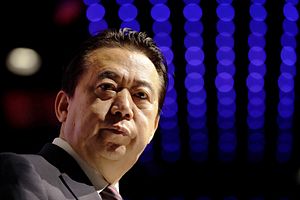At midnight on October 7, the Central Commission for Discipline Inspection (CCDI), the highest internal-control institution of the Chinese Communist Party (CCP), released an extremely short statement confirming that Chinese Deputy Public Security Minister Meng Hongwei, who is also the president of the International Criminal Police Organization (Interpol), has been detained by Chinese authorities.
CCDI’s statement announced that Meng is “under investigation by China’s National Supervision Commission (NSC) on suspicion of legal violations,” without revealing any further information.
This statement came one day after Lyon-based Interpol made a formal request to China for information about Meng. Soon afterward, Interpol issued a statement saying that Meng had resigned “with immediate effect.” Vice President Kim Jong-yang will take over as acting president until a election can be held at Interpol’s next general assembly in November 2018, the statement said. Meng had been the first Chinese president of Interpol, which was interpreted by many as a sign of China’s growing prestige on the international stage.
For days, Meng’s disappearance grabbed headlines in foreign media.
According to the Associated Press, Grace Meng, Meng Hongwei’s wife, reported on October 5 that she hadn’t heard from her husband since September 25, when her husband was on a trip back to China.
Grace Meng told reporters that Meng messaged her an emoji of knife that day, which she interpreted as a warning he was in danger. Four minutes earlier, he had sent her a message saying, “Wait for my call.” But she said she hasn’t heard from him since then and does not know what happened to him.
On October 5, Interpol released a media statement saying that the organization was aware of Meng’s “alleged disappearance.”
“This is a matter for the relevant authorities in both France and China,” Interpol added.
On October 6, Interpol released a second statement, claiming that it has made a formal request to China for information about Meng.
“Interpol’s General Secretariat looks forward to an official response from China’s authorities to address concerns over the President’s well-being,” the second statement emphasized.
Early on October 7, Grace Meng held a press conference in Lyon, speaking to reporters from around the world for the first time about her husband’s disappearance.
“From now on, I have gone from sorrow and fear to the pursuit of truth, justice, and responsibility toward history,” she said at the press conference. “For the husband whom I deeply love, for my young children, for the people of my motherland, for all the wives and children, so that their husbands and fathers will no longer disappear.”
Soon after the CCDI made public Meng’s status, Grace Meng, who first learned about the development from the AP, said she was struggling to believe what it said.
“This is political ruin and fall!” she wrote in a text message to the AP. “I can’t believe [it] because the rule of law [in] China is his lifelong pursuit.”
However, for many China watchers, the development, though dramatic, is not so unbelievable. Early in April, Meng had already lost his seat on China’s Public Security Ministry’s Communist Party Committee (its real decision-making body), although he is still listed on the ministry’s website as a deputy minister. For people who are familiar with China’s politics, this was a significant sign that Meng’s political career was in jeopardy.
Grace Meng’s latest call for help from the worldwide press — an unusual measure for family members of fallen Chinese senior officials — further indicated that Meng and his wife probably had prepared for the worst circumstances.
Early this year, China officially established the NSC, a new all-powerful anti-corruption agency that was written into the Chinese Constitution. Under the newly issued National Supervision Law, the NSC now is the highest body supervising all “public personnel” who exercise public authority.
As I elaborated in the December issue of The Diplomat magazine, the NSC has enormous investigative powers, including interrogating suspects; retaining custody; conducting searches, collections, sealing, seizures, and inspections; and, most importantly, detention. Notably, the NSC coined a new term – liuzhi (留置) – to define the its power to detain a corruption suspect for investigation.
The CCDI has longed used a secret detention mechanism called shuanggui (双规), but only on Party members. The shuanggui mechanism allows the CCDI to detain a Party member in a secret place for unlimited time. Human Rights Watch has condemned the shuanggui system for using arbitrary detention, solitary confinement, torture, and enforced disappearance. The new liuzhi mechanism in effect legalizes the shuanggui practice and make it applicable to not only Party members but any “public personnel.”
Most importantly, while being held in undisclosed “designated locations” by the NSC, detainees will not be guaranteed access to lawyers. Nor will their family be informed if doing so “would impede the investigation.”
Now that the CCDI has confirmed that Meng is detained by the NSC, it seems that Meng’s wife made a wise — but also risky — move to resort to the international press for help. Otherwise, she (and the world) might still be in the dark about her husband’s whereabouts.

































